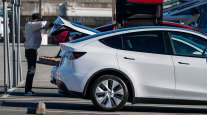Companies Explore Using Old Electric Car Batteries to Cut Costs

[Stay on top of transportation news: Get TTNews in your inbox.]
As major players jostle for market share in large-scale power storage, American Electric Power and Nissan Motor Co. are testing new technology that reuses old electric vehicle batteries to slash costs.
The pilot study in Ohio will road test technology that could lower system costs by about a half and extend the life of lithium-ion batteries by about a third, according to its Australian developer.
Costs of energy storage systems are falling globally on technology improvements, larger manufacturing volumes, increased competition among suppliers and as the sector adds more expertise, Bloomberg said in an October report. That’s driving an expansion in investment in projects to store power, with as much as $5 billion worth of deals possible this year for systems paired with renewable energy, according to the forecaster.
In part one of a two-part exploration of autonomous technology today, our latest RoadSigns podcast revisits conversations with CEOs Alex Rodrigues of Embark and Cetin Mericli of Locomation. Hear them explain what testing automated trucks and developing platooning technology has taught them about the road ahead — and get new perspective with host commentary. Listen to a snippet from Rodrigues above, and to hear the full episode, go to RoadSigns.TTNews.com.
American Electric’s Ohio study is using expired Nissan Leaf car batteries and is intended to test the innovations at scale after laboratory work in Australia and Japan.
Results so far appear promising, said Ram Sastry, American Electric’s vice president, innovation and technology. “It’s in a facility that we own but connected to the real grid.” he said.
The technology is developed by Melbourne-based Relectrify and uses old, or second-life, vehicle batteries and reduces the number of components needed, the company said Jan. 24 in a statement. That can reduce costs for key parts of typical industrial or grid storage systems to about $150 per kilowatt hour, it said.
That compares with a current average price for similar technology using new batteries of $289 a kilowatt hour, according to the BloombergNEF 2019 Energy Storage System Costs Survey.
Companies such as BMW AG and Toyota Motor Corp. already are putting reused cells to work in applications including renewable energy storage, electric vehicle charging, and to power street lights and homes. About three-quarters of vehicle batteries are likely to be reused, according to London-based researcher Circular Energy Storage.
Cheaper energy storage with batteries could provide an alternative to adding more capacity at electricity substations or building more transformers. It also could be harnessed to provide backup power and bolster reliability for consumers, according to American Electric’s Sastry.
“There are many use cases that we have for batteries that are predicated on the cost,” he said. “If the battery goes lower in cost, it can compete with the wires.”
Yet even as the price of lithium-ion battery cells has fallen, it’s been difficult to reduce costs of components such as inverters. “The inverter is the Achilles heel of energy storage,” said Bradley Smith, president of Covington, La.-based Beauvoir Consulting Services and previously an executive developing second-life battery products at Nissan.
Relectrify’s system reduces the need for separate electronics for both the inverter and battery management system, lowering costs, Smith said.

Relectrify's battery energy storage unit during a demonstration Australia on Jan. 17. (James Bugg/Bloomberg News)
The technology can also extend the lifespan of either reused or new batteries by offering more precise management of individual cells, according to Valentin Muenzel, CEO of Relectrify, a 14-person firm launched in 2015 that has collaborated with companies including Volkswagen AG and International Business Machines Corp.
Some potential end users remain wary of reusing lithium-ion batteries over concerns about their longevity and costs of repurposing cells, according to Logan Goldie-Scot, BloombergNEF’s head of clean power.
“Many customers are not yet comfortable with second-life batteries even at a steep discount,” he said. Tesla Inc. has in the past suggested it will favor recycling spent packs from vehicles to recover raw materials, rather than seek to reuse the cells first.
Relectrify, which is holding talks with battery manufacturers and distributors, sees potential to eventually help improve performance of batteries for the auto sector, in addition to energy storage.
“We see stationary storage as the low hanging fruit,” Muenzel said. “We’re already getting demand for use in some mobility applications, and we expect that is an area that will continue to grow with time.”
Want more news? Listen to today's daily briefing:





